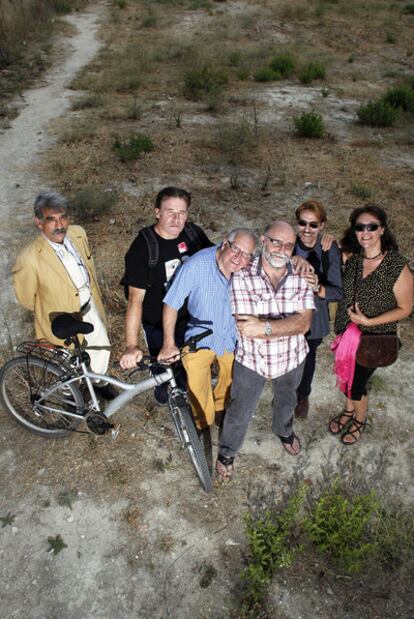An old people's home without a closet
A center for senior members of the gay community is being planned outside Madrid
"When a homosexual grows old and enters an old people's home, he goes back into the closet," says Federico Armenteros.
This 52-year-old social worker does not want to live his old age that way, and he does not want others to experience the "homophobia" of the homes run by the Catholic Church, or by other elderly people. That is why he is planning to build a retirement home for members of the LGBT community (lesbian, gay, bisexual and transgender). The Rivas-Vaciamadrid Town Hall has already ceded a plot of land for a 75-year period, operated under a government concession, in order to build the center.
Armenteros is the president of the XXVI Diciembre foundation - it takes its name from the day the social danger law, which was used to repress homosexuality during the last years of the Franco regime, was abolished - and is one of the 11 members of the cooperative who will assume the costs of the retirement home.
The project is already underway, although the foundation does not yet have the 14 million euros it needs to carry it out, and work has not yet begun. What it does have, though, is the plot, 16 partners and a handful of presentation leaflets in which it shows the design of the rooms and a building with a window displaying the rainbow flag as a "symbol of diversity."
The collective housing units will be 45 or 50 square meters in size and like loft apartments, with integrated bathrooms and kitchens. There will be a maximum of 115 units, each capable of housing two people. The facilities will be "luxurious," according to Armenteros.
The treasurer of the foundation and secretary of the cooperative, 42-year-old Inocente Aguado, nods his head as he listens to what Armenteros says. Neither is old enough to retire, but they both fit the cooperative's profile. They are both members of the LGBT community and are both over the age of 40. The foundation is searching for people who are fit both "physically and mentally" to be part of the project and "lend a hand." "Then, we will all take care of each other," Armenteros says.
This "small city" will be able to host up to 230 people and give work to another 30, who will be in charge of attending to the residents, according to the president of the project. The rooms will be "adapted" and everything will be "spotless."
The home will have an infirmary, a library, an assembly hall, a gym, a spa, a hairdressers and a cafeteria-restaurant so that guests will "not have to cook at home and will live in a community."
Benito Rogado, head of the project and member of the Salzhenia Group that administers the cooperative, translates Armenteros' words into euros. Each resident will pay "around 120,000 euros" for an apartment that he or she will buy in the form of an administrative concession for a 75-year period.
When the owner dies, their heirs will inherit the possibility of using the flat. But the cooperative's number-one partner is the XXVI Diciembre foundation and the idea is that, in the end, it will be in possession of the building when there are no other owners left.
Apartments that remain empty because, for example, "no relative wants to be in charge of the place or there are no heirs," will be used for welfare purposes. According to Armenteros, "through the foundation we will host HIV-positive people who have a low or insufficient pension."
At the end of the 75-year concession from Rivas-Vaciamadrid's town hall, the municipality will buy the property and administer it in return for an annual fee of 74,000 euros. That is why the leaders of the project chose Rivas, because it is a "gay friendly" city.
To convince financial institutions about the mortgage, the cooperative will ask for a loan amounting to 60 percent of the cost. The remaining 40 percent of the 14 million euros will come from the partners, who will pay installments until they receive their keys.
The monthly payment will be "more or less 700 euros," according to Rogado, for the first 30 months of building works, to cover that self-financing 40 percent, and "around 1,000 euros" when the owners are already living there.
From the 1,000 euros, some 600 euros will go towards paying the mortgage loan (payable in 20 years) and the rest will be invested so that everything is kept in working order. What is now missing to start the project is 99 more cooperative members before fall, when, according to Armenteros, it will start to negotiate with the banks and begin the works.

Tu suscripción se está usando en otro dispositivo
¿Quieres añadir otro usuario a tu suscripción?
Si continúas leyendo en este dispositivo, no se podrá leer en el otro.
FlechaTu suscripción se está usando en otro dispositivo y solo puedes acceder a EL PAÍS desde un dispositivo a la vez.
Si quieres compartir tu cuenta, cambia tu suscripción a la modalidad Premium, así podrás añadir otro usuario. Cada uno accederá con su propia cuenta de email, lo que os permitirá personalizar vuestra experiencia en EL PAÍS.
¿Tienes una suscripción de empresa? Accede aquí para contratar más cuentas.
En el caso de no saber quién está usando tu cuenta, te recomendamos cambiar tu contraseña aquí.
Si decides continuar compartiendo tu cuenta, este mensaje se mostrará en tu dispositivo y en el de la otra persona que está usando tu cuenta de forma indefinida, afectando a tu experiencia de lectura. Puedes consultar aquí los términos y condiciones de la suscripción digital.








































